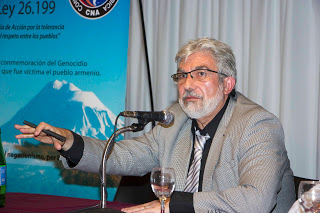(Agencia Prensa Armenia).- Last August, the Argentinean editorial Paidos published Khatchik DerGhougassian’s book about the conflict in the Middle East in it collection Everything You Need to Know About. The book in Spanish is entitled, as others in the same collection, Everything You Need to Know about the Conflict in the Middle East, and analyzes the conflictive political processes in the region since the 19th century. The Argentine press, including the weekly cultural supplement of Clarin and The Observatory supplement of Perfil, praised the book in review articles as a necessary reading to understand the current dynamics and published extended parts of it. DerGhougassian started the presentation of his book in October first at the National (public) University of Lanus. On November 14, the book was presented and discussed publicly at the Armenian Cultural Association. Along with the Armenian Cultural Association the Armenian National Committee of South America was the other organizer of the event under the auspice of IARA, the forum of the Armenian community’s institutions in Argentina.
The three panelists who joined DerGhougassian for the presentation were Pablo Kendikian, founder and current head of Prensa Armenia agency, Santiago Farrell a well-known journalist and international analyst of Perfil and Khodor Khalid the editor of the online publication Diario Sirio-Libanes.
In his opening words, Kendikian said that the Middle East has become one of the most complicated regions for reporters and citing Bill Kovach who defined journalism as “the first version of History” he underlined the value of the book that consisted in putting the abundant information about the events in a contextualized analysis.
 |
| Santiago Farrell, Khatchik DerGhougassian, Pablo Kendikian and Khodor Khalid |
“It is not only a book about the Middle East,” said Khodor Khalid. “It is a conceptual tool to analyze the conflicts in the region combining the diplomatic history approach with the crisis of the state.” The added value of the book is that it is accessible to any reader who either wants to have a general knowledge about the Middle East or the one who knowing the topic looks for additional knowledge.
For Santiago Farrell the main message of the book is the possibility of the Middle East ends up in a sort of “inclusive diversities.” “No one can deny these [ethnic, religious, sectarian etc.] diversities and go against them because they are fundamental. What is needed to be found are ways of coexistence,” he continued mentioning that despite deep political polarization the Argentine society could be an example of inclusion of diversities
After thanking the organizers, panelists and the public, DerGhougassian said that it was the tragic circumstances of the terrorist attacks against the Israeli Embassy in 1992 and the Jewish mutual AMIA in 1994 in Buenos Aires that created interest about the Middle East in Argentina where not only the region was little known but also expertise about it lacked despite that Syrian-Lebanese and Jewish descendants were respectively the third and forth most important communities in the country. “Being born and raised in Lebanon made me a source of reference for commentators and journalists long before I started writing academic papers and Op-Ed columns in the press or giving TV and Radio interviews especially after 9-11,” said DerGhougassian. However, he warned that the fact of being from the region is not necessarily an insurance to have a better knowledge in the cause-effect relationship of the dynamics of the conflict; less does it guarantee an ability to explain it to a wide audience. A strong theoretical perspective and a critical attitude are the conditions to overcome the subjectivity trap, he said. Thus, the book is the result of years of studying the region, writing about it and teaching it as a topic at the undergraduate and graduate levels. The book combines the theoretical perspective of the crisis of the State with the political sociology to study the struggle of power in the Middle East from what the author calls “the clash of two nationalisms” to the current “Intra-Islamic religious war”.
After the presentation, the floor was open for questions and an open discussion about the current situation in the region.
DerGhougassian is PhD in International Studies from University of Miami (Coral Gables, FL) with an expertise in international security. He is the chair of Theory of International Relations at Universidad Nacional de Lanus (now on leave) and a visiting professor at Universidad Torcuato Di Tella. Previously he taught at Universidad de San Andres and the American University of Armenia. He taught about the Middle East at ISEN, the diplomatic school of Argentina, among other institutions. Born in Lebanon, DerGhougassian moved to Argentina in 1987 to become the editor of Diario ARMENIA, the local Armenian community’s publication, till 1997. Last October he received the Ugarit 2017 prize of the Argentine Syrian-Lebanese Club for his input in the field of culture.
Further presentations of the book are foreseen soon including an academic round table discussion at Universidad Torcuato Di Tella on December 5.




















































